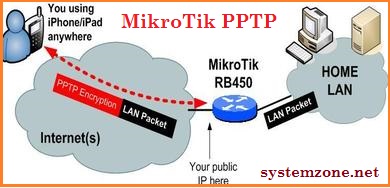VPN For Remote Workers Ensuring Secure Connections With MikroTik
Remote access VPN is a network that millions of people worldwide use to remotely access resources and data securely. With the growing trend of remote work, remote access VPN has become an essential tool for businesses to keep their workforces connected, productive and secure.

Remote access VPN allows employees to connect to their organization's network securely over the internet. When employees connect to their business's virtual private network (VPN), they can access company resources and data as though they were directly connected to the company's internal network.
Without remote access VPN, employees would have to rely on less secure methods, such as email or file sharing services, to access company resources. However, with remote access VPN, employees can rest assured that their connection is secure, and their data is protected from unauthorized access.
How Remote Access VPN Works:
Remote access VPN works by establishing a secure connection between the user's device and the company's internal network through an encrypted tunnel. This encrypted tunnel ensures that any data transmitted between the two endpoints is secure and protected from prying eyes.
With a remote access VPN, employees can securely access company resources and data from anywhere in the world. This is especially useful for employees who work while on the go or for those work from home.
Benefits of Remote Access VPN:
The benefits of remote access VPN for businesses are numerous. Here are some of the key advantages:
- Increased productivity: Remote access VPN allows businesses to connect with remote workers, increasing productivity and team collaboration.
- Increased flexibility: With remote access VPN, employees can work from anywhere, giving businesses increased flexibility and the ability to hire the best talent regardless of location.
- Reduced costs: Remote access VPN eliminates the need for businesses to invest in expensive hardware and infrastructure to support remote workers.
- Better security: Remote access VPN encrypts all data transmitted between the user's device and the company's internal network, providing a secure connection for confidential data shared over the internet.
Types of Remote Access VPN:
There are several types of remote access VPN, each with their unique features and capabilities. Here are some of the most common types of remote access VPN:
IPSec VPN:
IPSec VPN is a type of remote access VPN that uses the Internet Protocol Security (IPSec) protocol to encrypt data transmitted between the user's device and the company's internal network. IPSec VPN is known for its robust encryption capabilities and is commonly used for remote access to corporate networks.
SSL VPN:
Secure Socket Layer (SSL) VPN is a type of remote access VPN that uses the SSL protocol to establish a secure connection between the user's device and the company's internal network. SSL VPN is a popular choice for remote access because it does not require any special software on the user's device, making it easy to use.
PPTP VPN:
Point-to-Point Tunneling Protocol (PPTP) VPN is a type of remote access VPN that uses the PPTP protocol to encrypt data transmitted between the user's device and the company's internal network. PPTP VPN is one of the oldest types of VPNs and is considered a less secure option than other remote access VPN types.
Remote Access VPN Best Practices:
While remote access VPN offers many benefits, it is essential to follow best practices to ensure that the connection remains secure. Here are some best practices businesses can follow to enhance their remote access VPN:
- Use strong passwords: Encourage employees to use strong and unique passwords to access the remote access VPN. This will make it more difficult for hackers to gain unauthorized access to the network.
- Use two-factor authentication: Two-factor authentication adds an extra layer of security by requiring users to provide two forms of authentication to access the network.
- Update software: Make sure that all software used to access the remote access VPN is up-to-date to avoid vulnerabilities that hackers could exploit.
- Limit access: Only grant access to specific users who require access to the remote access VPN. This will limit the risk of unauthorized access to the network.
- Monitor network activity: Monitor network activity to detect any suspicious activity or unauthorized access attempts.
Conclusion:
Remote access VPN is an essential tool for businesses to allow employees to securely access resources and data from anywhere in the world. With its numerous benefits, remote access VPN is becoming increasingly popular among businesses worldwide. By following best practices and choosing the right remote access VPN type, businesses can enjoy the benefits of remote access VPN while keeping their network secure from hackers and unauthorized access.




Post a Comment for "VPN For Remote Workers Ensuring Secure Connections With MikroTik"